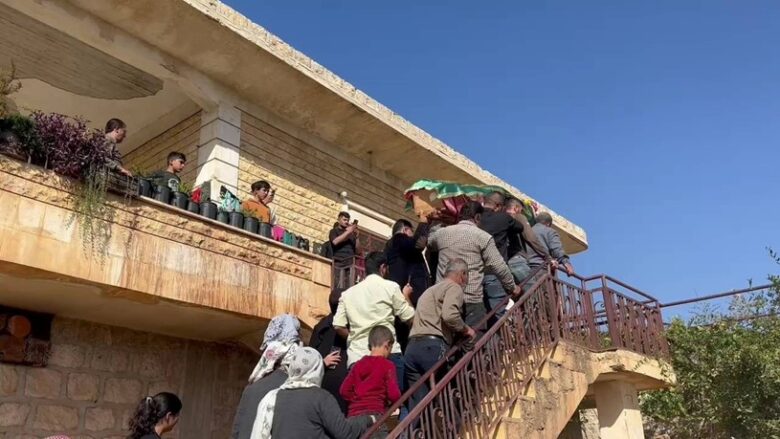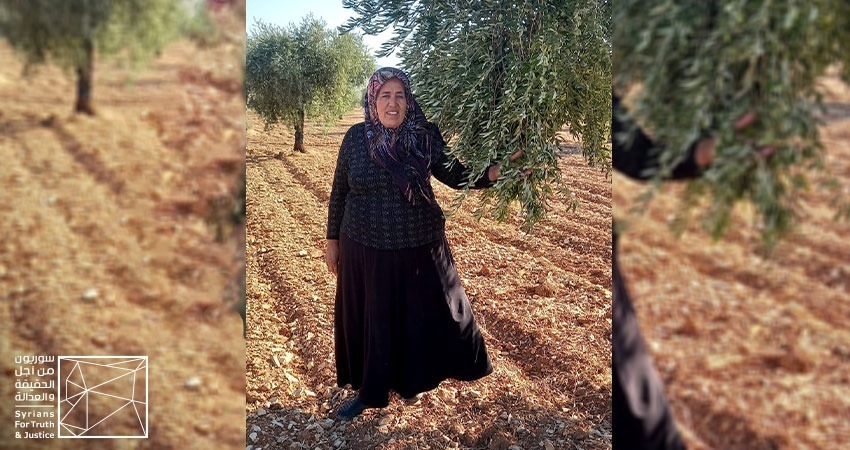The Kurdish lady, Malak Eibo, spent her last five years in remote displacement camps, living in agony and sorrow of losing her property in Ali Jaro/Jariya village of Afrin’s Bulbul district. Malak’s wish to return home came true, but after she died, she entered her house as a lifeless body carried on shoulders.
As the Turkish-backed Syrian opposition armed groups took over Afrin in March 2018, Malak’s family separated like tens of thousands of families in the region, which once was a Kurdish majority.
Malak Khalil Eibo, a 63-year-old widow of the late Abdel Manan Ibrahim, has seven married children. She spent three years displaced in the al-Shahba area. However, Malak recently returned to her village in the summer of 2021, hoping to restore the property of her family seized by the Northern Hawks Brigade, as confirmed by Kamal Ali (a pseudonym), a relative of Malak’s family.
The Northern Hawks Brigade is an armed militia supported by Türkiye. Syrians for Truth and Justice (STJ) has previously reported that the group has been encouraging internally displaced persons (IDPs) from various parts of Syria to settle in Afrin. Additionally, the militia has been renting houses that originally belonged to Kurdish individuals and using the rent as a source of funding for their military equipment and operations.
According to Kamal, Malak’s family was well off before losing all of their belongings due to displacement caused by Operation Olive Branch in 2018. Due to their poor financial situation, one of their elderly relatives decided to take a risk and return to their village in Afrin despite the security chaos caused by the presence of armed Islamic factions in the area for the past five years.
The Funeral Scene: Perpetrator next to Victim
On 7 November 2023, activists circulated a video on social media, showing civilians in rural Afrin carrying a coffin on their shoulders, taking it to the balcony of a house, where the wails of women were heard crying bitterly, while an adult one of them yelled in Kurdish: “This is your house, my aunt, this is your house, and what a shame you did not enter it until after your death.”
The circulated funeral scene revealed the suffering experienced by Malak and her family and “briefed Afrin’s story with the armed factions that entered it five years ago and are still practicing all kinds of violations against its Kurdish populace”, said Kamal.
Kamal added,
“Her last will was to have her coffin borne through the courtyard of her seized house since she failed to enter it alive.”
Kamal went on to say,
“Asmar Abu al-Ezz, a leader in the Northern Hawks Brigade, who appeared in the circulated video standing with his hands folded, was the one who seized the house of Malak’s family and part of their land. He would not even let her funeral enter the house without the intervention of village notables.”
According to the Kurdish Rudaw TV channel, Abu al-Ezz hails from the Al-Ghab area in the Hama countryside. Residents of the Ali Jaro village claim that he has taken control of several houses, including the house of Malak’s family, and that he is the one who controls the destiny of the village and its civilian residents.

Civilians carrying the coffin of the Kurdish lady Malak Khalil Eibo in the courtyard of her seized house as per her deathbed will.
Kamal reported that before the Turkish attack on the Afrin region, the Kurdish village of Ali Jaro had a total of 65 families. However, only 15 families have returned since the attack, with the majority of them being elderly people who returned without their relatives, the same as in the case of Malak Eibo.
Kamal stated that his relative, Malak, had been asking for her house back for two years, but the leader, Abu al-Ezz, was refusing to return it to her, arguing that she was a “woman without a mahram.” Even though her brother’s house was located opposite her house, the leader was insisting that one of her sons must return before he would return her house to her.
In a report released in mid-2023, the Independent International Commission of Inquiry on the Syrian Arab Republic (CoI- Syria) stated, “In one case, an elderly widow was forced to stay three nights on the street after she was expelled from her home by Faylaq al-Sham. One of the women described how, four years later, she had still not been able to recover her house, nor received any compensation. When approaching a local arbitration mechanism to claim her house, she was told “you’re alone, you don’t need a house just for you”. Another woman in Afrin whose home was confiscated by an Ahrar al-Sharqiya fighter described how she remained unable to regain access to her property several years later. When explaining to the fighter that she was herself the house owner, not her husband, the fighter was astounded as to how the property could possibly be owned by a woman.”
Leaving Without a Farewell
A few days before her death, Malak went to the center of Bulbul district to file a complaint against leaders of the Northern Hawks Brigade after its members raided her orchard, preventing her and the workers accompanying her from completing the olive harvest. They told her that the Brigade would be the one to pick the olives and distribute the harvest to the residents, according to Kamal.
Despite the circulars issued by the military and civilian leaderships of the Syrian opposition factions, prohibiting the collection of taxes from farmers during the olive season, Asmar Abu al-Ezz has continued to take over parts of Ali Jaro residents’ harvest. Kamal confirmed that Asmar usually allows Kurdish families to reap their harvest, on the condition that they must share at least half of it with him.
Following the attack on her orchard, Malak had a stroke, which caused her to stay several days in a hospital in Afrin. On this, Malak’s family testified, “She did not have any illness, and her health was good. Recently, however, she complained of anxiety and insomnia.”
Malak’s daughter, who was displaced with her family to the al-Shahba area, reported that her mother had contacted her on the morning of that day and informed her that she was preparing to harvest olives and sell them to the press immediately. This is because she could not bring her crop to her brother’s house, where she is currently staying, due to fears of robbery or potential threats from the controlling faction.
Malak’s children did not attend their mother’s funeral, except for her daughter who lives in Afrin. Kamal explained, “Her other children did not want to risk returning to Afrin, knowing that they might face another tragedy besides losing their mother.”

